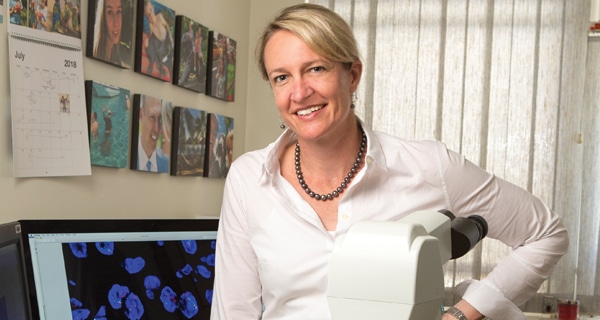January 2024—Much has been said and written about scoring HER2-low breast cancer, and it has its difficulties. But there are steps and tools to support scoring, and Savitri Krishnamurthy, MD, last fall shined a light on them and several HER2-low breast cancer-related studies.
Read More »Low level limbo in HER2 breast cancer
August 2023—Seemingly channeling the inspiration of Magritte and his famous pipe, pathologists are painting a new picture of what has long been an everyday object in their own world: HER2. To paraphrase the master: Ceci n’est pas facile. For years, HER2 testing in breast cancer has seemed self-evident, ever since the HER2-targeted therapy trastuzumab and its companion diagnostic arrived on the scene a quarter of a century ago. Pathologists became comfortable using immunohistochemistry to identify 3+ cases and turning to in situ hybridization techniques to sort through less obvious ones. But early last summer, a variant of the drug, trastuzumab-deruxtecan (T-DXd), shook up that routine. When researchers presented results from the Destiny-Breast04 study at the 2022 ASCO annual meeting, showing that T-DXd significantly improves survival in so-called HER2-low metastatic breast cancer, attendees responded with a minutes-long standing ovation. They then returned from the meeting like evangelicals from the revival tent.
Read More »Colorectal cancer next on HER2 horizon
May 2023—Behold the common coin. Note its two sides, its easy flippability. Here is Joseph Pizzolato, MD, with the first coin toss. Given the expanded use of biomarkers with a variety of tumors, and constantly evolving assays, how hard is it for medical oncologists to navigate testing? “It’s not difficult at all now,” says a cheerful Dr. Pizzolato, medical director of the comprehensive therapeutic unit of Sylvester Comprehensive Cancer Center, University of Miami Health System, as well as medical director of the Aventura satellite at Sylvester. With third-party companies integrating test ordering directly into electronic medical records, he adds, “It’s getting even easier to order tests and see the results.” Agreed, says his colleague Rhonda Yantiss, MD, director of surgical pathology, Department of Pathology and Laboratory Medicine, University of Miami Miller School of Medicine. And therein lies the problem. “It’s kind of a mess,” she says. In practice, precision medicine is becoming both more and less precise.
Read More »Breast cancer biomarkers, classic and new
February 2023—Like a thriving expat, Deborah Dillon, MD, is comfortable moving within worlds both old and new. Specifically, as a breast and molecular pathologist at Brigham and Women’s Hospital, she appreciates the biomarkers she and her colleagues grew up with, so to speak, as well as those that are part of a more recently arrived-at scenery. Not everyone finds both worlds equally riveting. “A lot of people are much more interested in, and excited by, new markers,” she says. “When I talk to people from pharma, this is what they want to hear about.” So do many pathologists, oncologists, and patients—new markers and new therapies have a way of updating hopes. Dr. Dillon understands the persistent thrill of the new, why people want her to talk the language of PIK3CA, PARP inhibitors, MMR, NTRK fusions, ESR1, and the like. But as an in-demand speaker as well as in a recent interview with CAP TODAY, she also advocates for making the old—the longstanding trinity of ER, PR, and HER2—seem new again.
Read More »Scoring HER2 expression across the full spectrum
October 2022—HER2-low breast cancers are now of greater clinical interest, given Enhertu’s recent approval for use in treating such cancers. How to achieve accurate and reproducible results in scoring HER2-low tumors was at the center of a CAP TODAY webinar on new perspectives on the full spectrum of HER2 expression in breast cancer.
Read More »Close-up on HER2 alterations in advanced NSCLC
August 2022—HER2 is a known oncogenic driver and emerging biomarker in non-small cell lung cancer, and while the therapeutic implication is not yet fully known in NSCLC, “we need to pay attention to it,” said Fred R. Hirsch, MD, PhD, executive director of the Mount Sinai Center for Thoracic Oncology and associate director, Tisch Cancer Institute, in a CAP TODAY webinar sponsored by Daiichi-Sankyo and AstraZeneca.
Read More »ER, PgR, HER2 expression rates seen in Q-Probes
June 2020—With release of the latest Q-Probes study, titled “Expression Rates in Invasive Breast Carcinoma,” the CAP Quality Practices Committee fills a gap by providing data collected from a diverse set of 21 U.S. laboratories on the average frequency of various ER, PgR, and HER2 expression results.
Read More »FDA approves neratinib for metastatic HER2+ breast cancer
April 2020—The FDA approved neratinib (Nerlynx, Puma Biotechnology) in combination with capecitabine for adult patients with advanced or metastatic HER2-positive breast cancer who have received two or more prior anti-HER2–based regimens in the metastatic setting.
ER/PgR guideline hones approach to ER-low positives
April 2020—The CAP and the American Society of Clinical Oncology released two years ago a focused update of their clinical practice guideline for HER2 testing for breast cancer, following an update in 2013. Read more.
Read More »FDA approves new treatment for HER2+ breast cancer
February 2020—The FDA granted accelerated approval to Enhertu (fam-trastuzumab deruxtecan-nxki) for the treatment of adults with unresectable or metastatic HER2-positive breast cancer who have received two or more prior anti-HER2–based regimens in the metastatic setting. Enhertu is a human epidermal growth factor receptor 2–directed antibody and topoisomerase inhibitor conjugate.
Quantitative image analysis: In guideline, preliminary rules for pathology’s third revolution
April 2019—With the release in January of a new guideline for quantitative image analysis of HER2 immunohistochemistry for breast cancer, the CAP believes it is filling a gap and blazing a trail for the profession. In setting evidence-based standards, the guideline provides background and details about the quantitative image analysis (QIA) process and the data and metadata it generates. The guideline will help facilitate pathology’s increasing use of not only digital pathology but also artificial intelligence, says Marilyn Bui, MD, PhD, chair of the CAP expert panel for QIA of HER2 IHC. “This is not just another guideline. It is a milestone for pathologists.”
Read More »Small groups, big answers in HER2 testing
July 2018—Take the new ASCO/CAP guideline for HER2 testing. Since the first groundbreaking joint guideline appeared 11 years ago, the authors have made a habit of addressing cases that flummox pathologists, medical oncologists, and patients. Now, in 2018, they have clarified the diagnostic approach to in situ hybridization groups two, three, and four, rare cases that nonetheless cause an outsized share of headaches and worries. It also clarifies language from the 2013 guideline that had sent some labs astray, and it addresses the use of multiple alternative chromosome 17 probe assays. The previous guidelines turned out to be tough acts to follow—a bit like following Sean Connery in the role of James Bond—even as the new one benefits from new data.
Read More »Second act for HER2, in gastric cancers
May 2014—If one were to map out a “family tree” of tumors, breast and gastric cancers might end up looking like second cousins. One is common, the other is not, but it’s rapidly becoming known that they share a kinship of sorts with HER2 testing and the targeted therapy trastuzumab.
Read More »New guideline takes on tough HER2 cases
October 2013—In HER2 testing for breast cancer, the term “equivocal” verges on being a four-letter word. If the patient has a clearly positive test result, therapies targeting HER2 become a treatment option, and a highly successful one at that. If the result is clearly negative, HER2-targeting drugs are off the table; the patient isn’t expected to benefit from the drugs, which are expensive and can be cardio- toxic.
Read More » CAP TODAY Pathology/Laboratory Medicine/Laboratory Management
CAP TODAY Pathology/Laboratory Medicine/Laboratory Management







